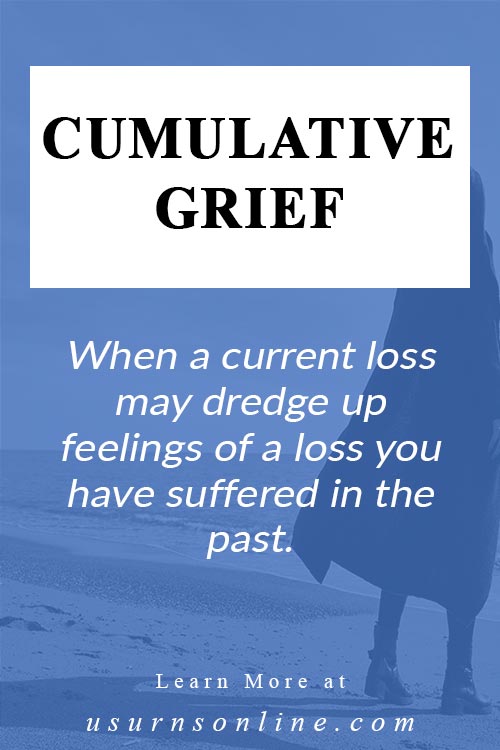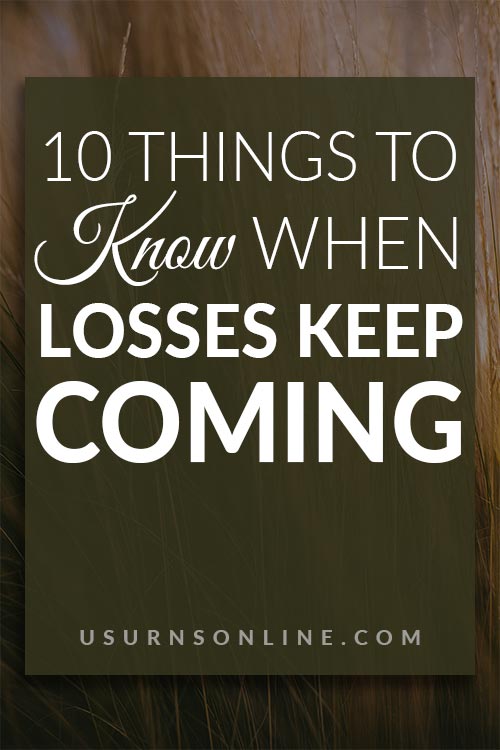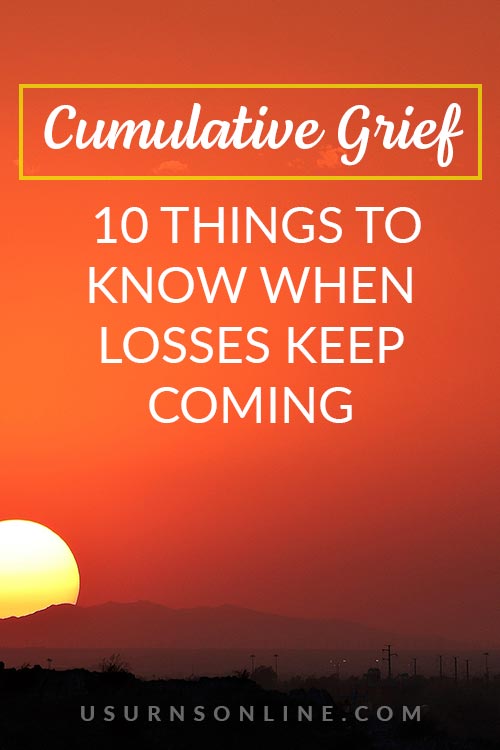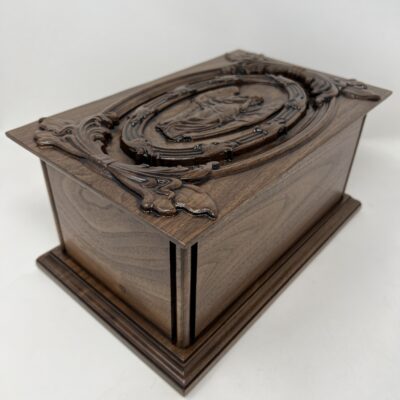Grief. We all will experience it at some point. But what about when the losses keep accumulating, keep coming one after another?
You may be experiencing a particular type of grief known as cumulative grief. Have you ever thought about what type of grief are you going through? You may have many questions. Is it time for you to seek professional help with your grief? Are you feeling physically ill from suffering emotionally?
These are all common questions, and ones that will be answered in this article. Please continue to read and learn about cumulative grief.
Cumulative Grief Definition

Cumulative grief can occur when you experience multiple losses; either all at once or before processing an earlier loss. This type of grief happens when the current loss dredges up the feeling of loss you may have suffered in the recent past.
Cumulative Grief Symptoms
Cumulative grief symptoms can vary from person to person. This might include:
- Feeling overwhelmed
- Avoiding processing your loss because it is just too much to handle
- Processing one loss but unable to process any more losses
- Feeling numb
- High blood pressure
- Sleeplessness
Cumulative Grief vs. Compounded Grief
Cumulative and compounded grief are similar, but with one important distinction.
Compounded grief is when all of your grief from over a lifetime gets compromised and then causes you to spiral downward over one tragic event, such as death. Cumulative grief is experiencing multiple losses within a short period of time.
How to Cope with Cumulative Grief
You must give each loss its own time and find a way to honor them individually. Try not to lump all of your losses together, as it may only serve to minimize the importance that each person or event played in your life.
As you do your best to grieve each loss distinctly, make sure you accept the realities of grief. Your bodily chemicals may get out of sorts, you may feel overwhelmed and fatigued, you may find daily tasks difficult. You will feel sad, of course, and there may be days when you just can’t face things. This is normal. Don’t be overly worried, but keep moving forward.
Here are some additional things to know to help you cope with cumulative grief.
Urns Made in the USA
10 Things to Know about Cumulative Grief
It is all too frequent that another death follows one death. The experience of suffering a second loss before you have grieved the initial loss is sometimes known as “cumulative grief,” “bereavement overload,” or “grief overload.”
1. Grief requires time.
When you have suffered any loss, it takes time to work through it. If you don’t have the time you need before another loss occurs, you may end up overwhelmed.
Grief cannot be rushed. You may revisit the same feelings again and again.
2. You may try to avoid dealing with your loss.
Initially, avoidance will help you function from day to day. But it is vital to make an effort to face the reality of your loss. Avoidance can’t continue for very long. The feelings of loss will just continue to stack on top of each other.
3. Age can increase the risk for cumulative grief.
As people age and get into their 70s, 80s, and even 90s, they may find themselves experiencing the deaths of friends and family members more regularly. This can put the elderly at a higher risk for cumulative grief.
4. Substance abuse can increase the risk for cumulative grief.
If you are using drugs or alcohol to numb grief, you may never fully grieve your losses. People are prone to avoid grieving while using drugs or alcohol.
When you stop using drugs or alcohol, you may find yourself facing multiple losses from the past that you avoided with substances.
5. Cumulative grief can put a strain on your faith.
After suffering multiple losses, you may feel as if God is punishing you. It is important to know that it is normal if your faith shakes as a result of grief.
At times it can be hard to justify a good God when you are feeling so much pain.
A gentle reminder to us is found in Psalms 34:18: The Lord is close to the brokenhearted and saves those who are crushed in spirit.
More: Comforting Scripture Verses for Those Who Grieve
6. Find a counselor, life coach, or spiritual director to help you process your grief.
Finding professional help is always a good idea and never something to be embarrassed over.
Do a quick Google search for your area. You will find an abundance of people waiting to help you.
7. Cumulative grief will affect your physical health.
Grief is devastating emotionally, mentally, and physically. It can raise blood pressure and increase the risk of blood clots. Intense grief can alter the heart muscle so much that it causes “broken heart syndrome.” This is a form of heart disease with the same symptoms as a heart attack.
The pain of grief can make it difficult to sleep, eat, or even think straight.
8. Cumulative grief involves “other” kinds of losses too.
The loss of a husband or wife might lead to the loss of a home, a change in friends, the need to change jobs, the loss of identity, a reduction in income, and a loss of future dreams.
Each of these losses should be grieved separately.
9. When you are grieving multiple losses at once, everything is heightened.
Feeling all of the emotions may seem unreasonably difficult, but so is the alternative. Trying to ignore the pain also becomes harder. The adverse results of ignoring grief are more noticeable; your health may begin to suffer.
10. Recognize that grief is cyclical.
One day your pain will begin to lessen, and you will feel like you are making headway. The next day you may be starting at ground zero again. This is normal. Painful feelings will surface again.
Keep in mind; you can make way for joy and happiness! These emotions will be a part of your daily life again. Being happy does not negate the love you had for your lost loved one. Your life must go on even as your remember and honor your beloved.
Read next: How to Grieve Well
Pin It






Cumulative grief does not lesson overtime, in my experience. The happiness factor is fleeting, one day maybe and the next day, right back. I’m saying this as my entire immediate family died when I was 55. Big family, close close family then gone. You never trust anything or anyone ever again because they all said it’ll be ok,they all say “it’s a club death is we are all going to die”. Yes I get it just not everybody. How can it be ok when you have nothing left, no one to talk to only those who want something. I truly hope one day it’ll come true, however I don’t think it will.
Lights are on but no one ever answers the door.
Cumulative grief does not lesson overtime, in my experience. The happiness factor is fleeting, one day maybe and the next day, right back. I’m saying this as my entire immediate family died when I was 55. Big family, close close family then gone. You never trust anything or anyone ever again because they all said it’ll be ok,they all say “it’s a club death is we are all going to die”. Yes I get it just not everybody. How can it be ok when you have nothing left, no one to talk to only those who want something. I truly hope one day it’ll come true, however I don’t think it will.
Lights are on but no one ever answers the door.
I lost 7 loved ones in 2022. Its been tuff. Now my oldest sister died last week. I have a sweet cousin that is on hospice now. I know I am in my 70’s now. My Mother told me as you get older you will loose more people. It is so true. But it doesn’t make it any easier when they are close together.